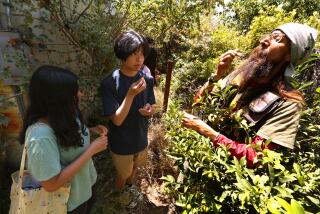In a Class by Itself : Education: Students learn <i> and</i> have fun in Starship Topanga. Parents are heavily involved, unlike in typical winter-break enrichment programs.
- Share via
Nearly all the second- and third-graders in Ann Matsuyama’s class raised their hands when she asked how many like sushi.
That would be shocking in most schools. Then again, this was Topanga, where life marches to a different drummer and where there isn’t even one Domino’s Pizza outlet.
But even here, few of the students had ever tried to make the Japanese staple.
Until last week.
With finger bowls in easy reach, two dozen Topanga School youngsters stuffed their leaves of nori (roasted seaweed) with sticky rice, rolled them into sausage shapes, sliced them into oddly sized pieces and snacked on their handiwork--even if the cucumber filling was a trifle tame for some.
“They’re so regular,” Zach Sharrin, 9, said with the disdain of a true connoisseur. “I like quail eggs and sea urchins.”
He and his classmates were participating in Matsuyama’s weeklong Japanese culture class, one of the many offerings in Topanga’s unusual Starship Topanga program. Unlike most other school-based programs designed to give working--or just plain weary--parents a break from keeping their children entertained during the long winter vacation, Starship Topanga is entirely funded, planned and directed by parents at the school.
“Parent involvement here is outstanding,” Principal Steve Friedman said. “It would be optimum for any school.”
The $30,000 program is the brainchild of Bob Garber, 44, a Pierce College dean whose two sons attend the school. A year ago, when the Los Angeles school board adopted a year-round calendar for all its campuses, Garber recognized the need that parents would have for some form of relief in supervising their children over the extended midyear recess.
“When they went to a year-round schedule and people were facing an eight-week-long break, we basically said, ‘Let’s get on this,’ ” he said.
The need seemed particularly evident because many of the programs that sprang up to assist parents were merely day-care services and camps.
So Garber and a handful of others decided to develop an enrichment program--a logical extension of a similar program that operates at Topanga throughout the regular school year. Garber himself set up that program three years ago when the after-school supervision offered daily by the YMCA was abruptly curtailed.
“This is what I do for a living, what I like to do, design programs and make them happen,” said Garber, who oversees student services at the Woodland Hills college.
In the winter Starship program, parents could enroll their children for $17 a day per child in a three-week session that began earlier this month and/or a two-week session that began Jan. 27. Grouped by grade levels, the students--about 100 in all--spend every weekday until 2:30 p.m. at the school, attending classes in computers, science, drama, and arts and culture.
But Garber consciously sought to avoid duplicating a school-like atmosphere since the youngsters would technically be on vacation.
Most of the teachers recruited for the program work for outside organizations or at schools other than Topanga. The educational aspects of the classes are cloaked by a mantle of fun.
“Somehow they’ll not know they’re learning,” said Jean Dillingham, an instructor with the Topanga-Las Virgenes Resource Conservation District.
In Dillingham’s science unit, for example, students play a game using spoons, clothespins and scissors to pick up small objects like marbles and washers to learn how different types of bird bills work.
During the drama segment, youngsters take mime, improvisation and even fencing lessons from players hired from the Will Geer Theatricum Botanicum, a professional repertory company that runs a youth drama camp down the street.
And in Bill Merkelson’s class, the children become familiar with Macintosh computers through educational games that teach them to count, draw, do arithmetic or plan the creation of entire cities and their infrastructures. The class is a big hit with students, who battle for the privilege of spending lunchtime in the computer lab in front of one of two color computer monitors, both leased for Starship Topanga.
“This is one of the best things I’ve seen in years,” said Merkelson, a teacher at 3rd Street School in Los Angeles. “The quality here is terrific.”
Last week, many of the students tended to concur with that assessment, even those who initially needed some parental prompting before sacrificing their precious vacation time.
“I didn’t have to come,” said Jeremy Meyer, 9, who spent the first part of the break visiting Napa Valley and watching movies. But his parents told him to try the program and “see what I thought,” he said. “I really liked it.”
“It’s fun,” agreed Zach, the third-grade sushi expert, who has also studied Chumash Indian customs as part of the arts and culture component of the program.
This week, following Matsuyama’s Japanese culture class, he and his classmates will be treated to a unit on African music and cuisine.
“There’s no homework, no tests,” Zach pointed out. “That’s the best part--no math quizzes.”
For parents, the advantages lie not just in the availability of day care for their children but in the opportunity to help defray tuition costs by volunteering as teacher aides. The program also affords parents the latitude to plan spontaneous family trips and activities since teachers take attendance but don’t enforce it.
Jenifer Sanders, 43, a free-lance bookkeeper, immediately enrolled her fourth-grade daughter last fall when word of the program reached her.
“As soon as I heard they were going to do it back in September, I signed her up. She was one of the first,” Sanders said during one of her volunteer shifts. “This is excellent. This is beautifully run from a parent’s point of view.”
And from a kid’s point of view, according to mother Meg Inkeles, 38. She said her daughter now can’t wait to sample each day’s new activities.
“I’ve given her the opportunity to stay home and said, ‘You don’t have to go,’ ” Inkeles said. “But she’ll do anything to come. She doesn’t want to miss a day.”
More to Read
Sign up for Essential California
The most important California stories and recommendations in your inbox every morning.
You may occasionally receive promotional content from the Los Angeles Times.














